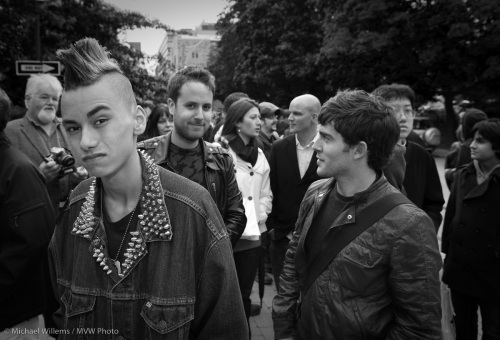As a photographer, you deal with all sorts of difficult situations. One is when people do not want you to take pictures.
Sometimes this happens at family gatherings. I find this hard to deal with – first, because it is such a central part of what I do. “No pictures!” to me is like saying “don’t discuss art” to a sculptor, or “don’t look beautiful” to a model, or “no perfumes allowed” to someone who has just spent $100 on nice perfume. Second, I find it irrational. Like “don’t look at me. You are stealing my soul”. Wear a veil, already! By taking photos of family gathering I do not steal anyone’s soul. Third, it is inconsiderate to all the others present, who do want photos of the event.
But yes, in a private setting, people totally have the right to say “no photos”. As a reasonable photographer, when that happens, I stop taking pictures, of course. Just don’t expect me to go back there: I have better things to do.
In the street, things are different. In English-speaking Canada, as well as in the US, if you are in a public area, you have the right to take pictures of anything and anyone you like (although there are exceptions like military installations).
But in the street, while you have the right to take pictures, things are not that simple there, either.
Typically, when anyone asks me to stop taking pictures in the street, I will. But not always.
You can get nice snaps in the street, and no souls are lost in the process.




This is a big peeve of mine and I’ve written a lot about it on my blog. From Flickr banning members (not me) for what they call “voyeur” pictures (although I believe they misuse the word), to the ubiquitous “no photography” signs in Thailand that I often ignore.
When you say “English-speaking Canada” does that imply that the laws are different in French-speaking Canada?
Street photographers in the US and UK have had a bad time with police questioning their motives and some new laws give them very broad powers that can be abused. But the Brits at least are pushing back. There’s a UK pressure group called “I’m a Photographer Not a Terrorist” that’s drawing attention to this. (http://photographernotaterrorist.org/).
But the question I always ask myself is, what if the situation was reversed? How would you feel if you found a candid photo of yourself (maybe not looking your best) on Flickr or some other photo site?
Ah. A few answers. First, yes, in Quebec (like in France), if someone does not want you to take their picture, you cannot.
Yes, street is suspicious now, for some reason I do not understand.
As for what if.. well, I sympathise, and I will be sensitive, and I would hope other photographers would do the same to me – but that said, the street is not mine, and the photons are public. If I walk around I also do not have the right to tell people “do not look at me, I have not done my hair”. If I go out with my hair not done, then so be it – my problem.
In a way, this is a free speech issue. I would also like people not to say bad things about me. Same issue. I want to be photographed and discussed in a good light. But would I be in favour of a prohibition against saying bad things about me? Nope.
Maybe there is a distinction between taking a photo (for my own enjoyment or development of my skills) and publishing it to the world. Services like Flickr have made that much easier.
Do you know how that privacy law is enforced in PQ or France? If somebody snaps my photo on Paris and I don’t want them to, do I as a private person have a right to confront them and demand they delete it? Or do I summon a police officer or call 999, 911 or whatever? I am sure the police would see that as a very high priority!
Of course I may not be able to catch the offending photographer.
But then I later see the photo of me on Flickr. Is Flickr required by PQ / French law to take down photos that the subject does not approve of? How do I prove to them that it is me?
I wonder how it works in practice. Perhaps the law was passed primarily to protect celebrities against paparazzi. Viz. what happened to Lady Diana, the former Princess of Wales.
In law you have some protection in libel / slander law against me saying or writing bad things about you that are untrue and written with malice. Perhaps some believe there should be an equal protection against “malicious” images.
It’s a messy area – and a lawyer’s delight.